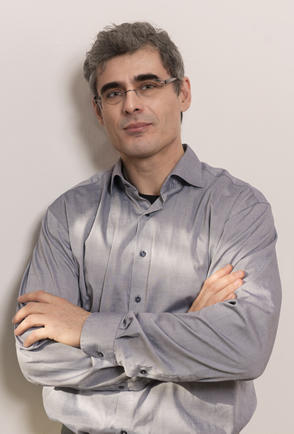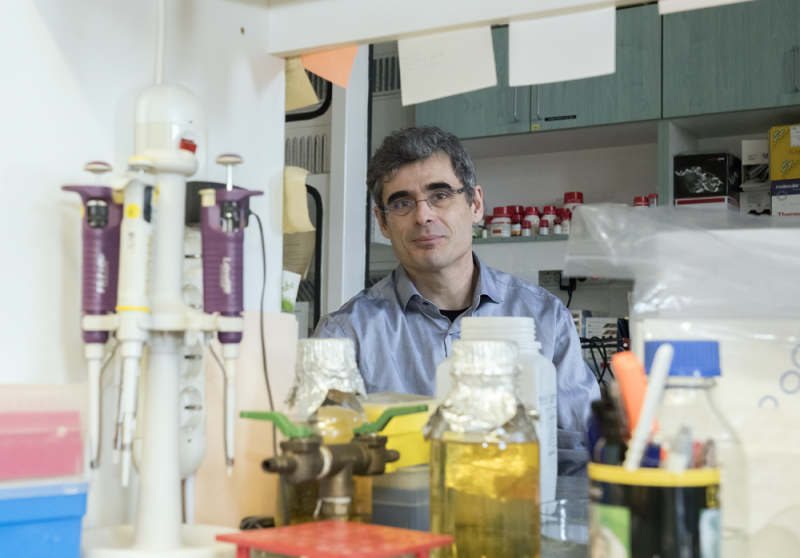
Csaba Pál, Bolyai Prize-winning biologist, head of the Evolutionary Systems Biology Group at the Biological Research Centre of the Hungarian Academy of Sciences in Szeged
The Frontline call was announced just about when you opened a new direction in your research. Is this new area connected to your earlier study of the resistance of bacteria to antibiotics, which received a lot of publicity and acclaim?
Yes, in the sense that both take protection against pathogens as a starting-point. Antibiotics protect us from many types of pathogens but the main role is played by the immune system. The first line of defence of the adaptive immune system is given by the so-called MHC molecules. These ‘advance guards’ bind a significant part of pathogen molecules, so they are essential for the immune response. MHC molecules also have a peculiar characteristic: they may vary from person to person and this diversity can be linked to a variety of diseases. In the new ‘Frontline’ research project we want to understand the role and the background of this diversity.
We assume that there are so-called specialist and generalist MHC molecules. The former group recognises only a few pathogens, while the latter group recognises many of them so they provoke an immune response to many types of viruses, bacteria, worms, fungi and protozoa. This is a huge difference and of great importance. Our hypothesis is that the diversity of the immune system and the MHC molecules are determined by the pathogens.
In geographical regions flourishing with pathogens (such as the tropics) generalist molecules are needed, while in other places (such as in Northern Europe) specialists will be enough for the effective operation of the immune system. To our greatest surprise, based on the preliminary analysis of the data available online, this indeed appears to be an existing, strong trend: the diversity may really be caused by pathogens. The phenomenon also has another reading. When human populations emigrated from Africa, they met newer and newer pathogens and only the most resistant individuals could survive these diseases. So, in essence, pathogens ‘fuelled’ the evolution of the immune system, they determined what type of variations may occur in different continents and regions even today.
So, people with generalist MHC molecules are luckier?
Generalists could not spread everywhere, so this property has a price. In our opinion the price they paid for the advantage is that the molecules can ‘swing to the other extreme’, that is, they can trigger immune reactions even to the body’s own molecules, and thus increase the individual’s susceptibility to autoimmune diseases. It depends on the compromise between the benefits and disadvantages what type of MHC molecules we find in the different regions, which in turn depends on the number of pathogens in the environment.
You have earlier suggested that this compromise may also affect the effectiveness of vaccines.
The long-term effects of vaccination may differ in two persons precisely because they have different MHC molecules. This is no news. What we want to find out is whether generalists develop greater protection than specialists in the long run.
So vaccines are more efficient in the tropics?
Perhaps yes, but our aim for the time being is to understand the basic principle from the massive amount of data: what makes certain MHC molecules and molecule families favourable or unfavourable?
Can this knowledge bring us closer to personalised medicine? Or to a world where two neighbours will not receive the same vaccinations?
If we understand the driving force behind our genetic diversity and how it influences susceptibility to different diseases, we will have made a great step toward personalised medicine, indeed. People may not necessarily have to receive different types of vaccinations but we definitely have to pay attention to when it is time for revaccination and whose immunity needs to be checked more often. But for this we have to first understand the phenomenon.
Hopes are that the understanding of the significance of generalists can be a milestone in evolutionary medicine.
Evolutionary medicine marks the shift in thinking that we need to understand the evolutionary past of humans and the genetic diversity around us to find the most appropriate medical treatments. This is how it relates to personalised medicine.
I will give you a simple example. According to the former standard medical approach, fever can be a very dangerous thing to the human body, so it must be reduced. Evolutionary medicine, however, states that fever is a natural defensive reaction of the body which has developed through millions of years. For instance, it serves to keep the patient at rest so that the immune system can defeat the pathogens, therefore, you do not necessarily have to treat a fever of 38 degrees Celsius. This is a major change in the mindset.
So is the realisation that we cannot treat everyone in the same way due to the humans’ immense genetic diversity. Our sensitivity to different pathogens and diseases vary which is also part of our evolutionary heritage. And now we have reached the level of protein molecules. We assume that there are certain, not too ‘picky’ MHC molecules (which are also proteins) that can bind many types of pathogen molecules, so they play a fundamental role in the fight against diseases. This is all the result of evolution.
How can you prove your hypothesis?
The first important step is data collection: we have to identify which MHC molecules are generalists and which are specialists. Then we will examine whether generalists really behave differently: are the immune responses of people with generalist MHC molecules more effective than those of people with specialist ones? We carry out these examinations on human blood samples. In addition, there is also a very exciting and somewhat futuristic plan: we will develop MHC molecules in vitro through directed evolution. Our aim is to have MHC molecules bind the right molecule of a given pathogen. We want to find out whether the new molecules resulting from the process, which have never existed in any human body, will be more specialists or more generalists.
Do your results get the same attention as those published from a prestigious American university?
Yes, the ‘Frontline’ grant from the NRDI Fund enabled us to make an exciting but risky scientific endeavour here in Hungary. We have put almost all eggs in one basket. Five young but very talented researchers are going to work on this topic. I would like to mention Máté Manczinger who came up with the main idea of the project and who is mainly responsible for the results achieved so far. I try to ‘pave the way’ of the project through my experience and professional relationships. We are also building cooperation relationships with a number of foreign research groups. If the result produced in my lab achieves the same impact as that of a prestigious American group, it will have the same weight in the international ‘arena’. This was the case in the antibiotic research – though, we needed three or four years to achieve that level, but we did. So, I am quite optimistic in this respect.







